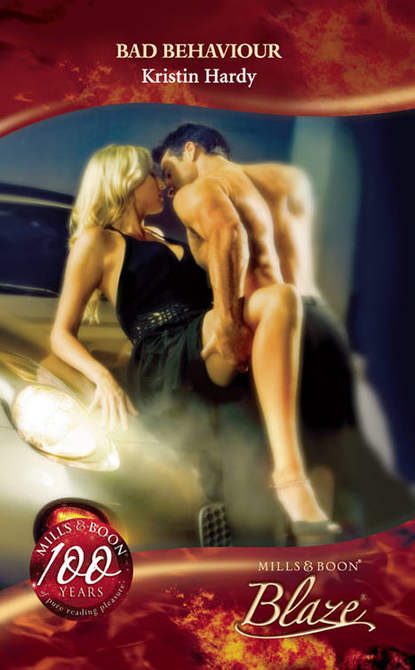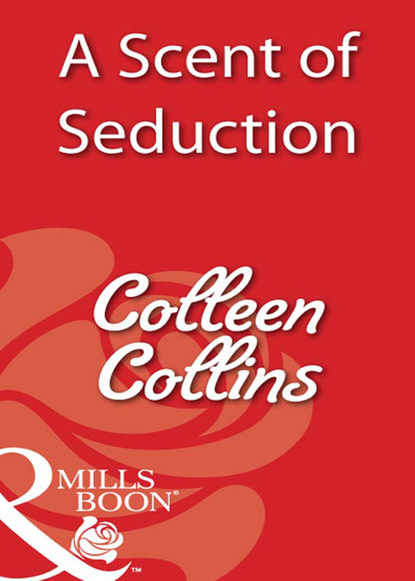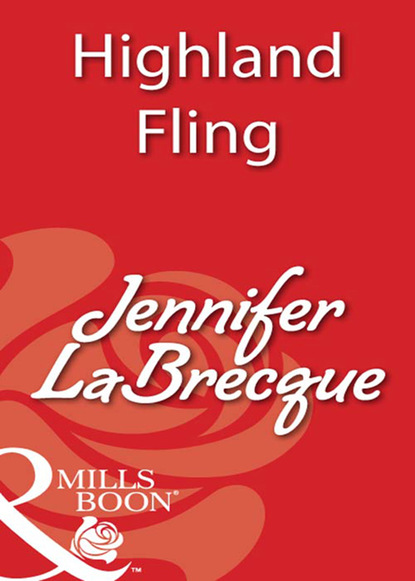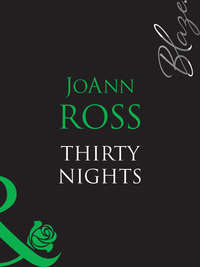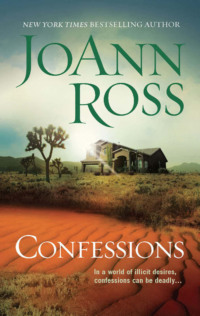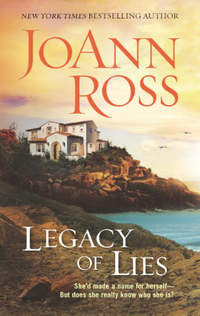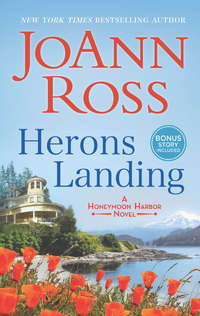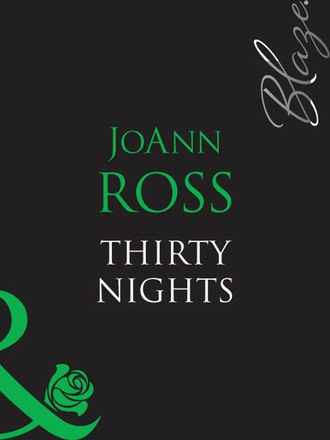
Полная версия
Thirty Nights

Without warning, Hunter yanked the sweater over Gillian’s head.
“I never would have taken you for a white cotton girl,” he murmured with a faint note of amusement as he eyed her utilitarian bra.
“Cotton’s comfortable,” she protested breathlessly.
“It’s also not the least bit erotic.” Imprisoning both her wrists in one hand, he released the front catch with a deft flick of his wrist.
“I would think I should be allowed to wear whatever I please,” she whispered as her heart started to beat faster. Harder. “The days are my own.”
“I lied.” The long hard fingers of his right hand cupped her breast. “Feel how your body warms to my touch,” he said. He lifted her breast and kissed the pale crevice beneath it, causing heat to pool in her lower body.
“I could take you right now. I could make you come…again and again. I could give you the best sex of your life, Gillian. And leave you begging for more…”
His words both shocked and aroused her. And somehow bound her to him as inexorably as a pair of velvet handcuffs might bind her to his bed.
Thirty Nights
JoAnn Ross

MILLS & BOON
Before you start reading, why not sign up?
Thank you for downloading this Mills & Boon book. If you want to hear about exclusive discounts, special offers and competitions, sign up to our email newsletter today!
SIGN ME UP!
Or simply visit
signup.millsandboon.co.uk
Mills & Boon emails are completely free to receive and you can unsubscribe at any time via the link in any email we send you.
A NOTE FROM THE AUTHOR…
I’d like to share a secret with you: Thirty Nights was not originally written for publication. It began as a story I made up to amuse myself—and my husband—while snowed in at our mountain cabin. My personal fantasies have always revolved around the dark and dangerous. Even as a child I preferred Beauty’s Beast to Cinderella’s Prince, Batman to Superman, and my favorite movie was The Phantom of the Opera.
I adore reluctant heroes with tragic pasts, men who’ve put themselves in harm’s way and have been wounded, physically, emotionally, or both in the process. Hunter St. John is such a man: the quintessential “beast” hiding away on his remote island, he’s built an impenetrable wall around his emotions. But Gillian Cassidy is determined to tear down that hateful wall, unlock those chains around his heart and expose Hunter to the healing powers of love.
Thirty Nights is a very special book to me. Writing it allowed me to follow my characters on their edgy, erotic journey. Hunter is not an easy man to love, but by the time I wrote The End, Gillian and I had both fallen madly, passionately in love with him. I hope you will, too.
I love to hear from readers. You can write to me or sign up for an electronic newsletter at www.joannross.com.
Warmest,

Contents
Prologue
Chapter 1
Chapter 2
Chapter 3
Chapter 4
Chapter 5
Chapter 6
Chapter 7
Chapter 8
Chapter 9
Chapter 10
Chapter 11
Chapter 12
Chapter 13
Chapter 14
Chapter 15
Chapter 16
Epilogue
Prologue
Cambridge, Massachusetts
TO A CASUAL VISITOR, the leafy campus of the Massachusetts Institute of Technology, located on the banks of the Charles River, would appear to be a peaceful glade. In this case, appearances were definitely deceiving. Inside a sixty-year-old ivy covered red brick building a battle royal was raging.
Hunter St. John was furious enough to kill the man he’d mistakenly considered a mentor. If this had been the Stone Age, he would have picked up the nearest club and bashed George Cassidy’s head in. Civilization being what it was, he was forced to fight with mere words.
“You stole my research and used it as your own.”
“There you go again, being overly dramatic.” The older man dismissed the complaint with a brief wave of his hand. “Sometimes I worry about you, St. John.”
“The gene-splicing project was mine,” Hunter insisted.
“You’re my research assistant, everything you do while a student here rightfully belongs to me. Including that little gene-splicing experiment.”
“That little gene-splicing experiment just won you a research grant from the National Institutes of Health, dammit.”
Cassidy’s features took on an expression of smug satisfaction. “It was well deserved.”
“It was my project.” Hunter’s growl was that of a wolf who’d just come across an interloper approaching his den. “I came up with it, I pushed it, I babied it along, going without sleep to work on it during hours I wasn’t working on your research. You had no right to it.”
To Hunter’s amazement, Cassidy actually had the nerve to smile. “You’re a bright young man, St. John. However, I fear that you lack the emotional restraint necessary to succeed in the research field. Along with a keen intellect and a deep-seated curiosity, a scientist must possess a clear and cool head. Which you lack. Which is why I regrettably had to notify the administration you were no longer suited to work here.”
Hunter had always known George Cassidy to be an egotistical, coldhearted son of a bitch. Since that seemed to be the norm in the world of scientific research, he hadn’t been particularly bothered by his behavior. But this treachery was beyond anything even he could have imagined.
“You had me taken off the project? I’m canned?”
“That’s not exactly the word I would have chosen, but yes.”
A fury like nothing he’d ever before experienced surged through Hunter. He curled his hands into fists at his sides to keep from pounding them into the supercilious bastard’s handsome face. “I could kill you.”
“Oh, you wouldn’t want to do that,” Cassidy countered. “Believe me, Hunter, my boy, the laboratory facilities in prison are definitely not up to your standards.”
When Hunter didn’t even bother to respond, the older man shook his head in mock remorse. “You’re making too much of this,” he repeated. “You’re a young man, only twenty years old—”
“I’m twenty-one.” Following in his brilliant late father’s footsteps, he’d already garnered a medical degree from Harvard and a master’s in biochemistry from MIT. The gene-splicing project Cassidy had so blithely pirated had been Hunter’s doctoral work.
“You’re still a wet-behind-the-ears pup. There will be more projects for you to work on.”
“I had a project, dammit. Until it was stolen from me.”
“Really, my boy, your choice of words is not only inaccurate, it’s redundant.” Appearing bored with this conversation, Cassidy opened a cage, pulled out a white research rabbit and prepared to draw a blood sample.
It was not in Hunter’s nature to surrender without a fight. “I could go to the administration and tell them what you’ve done.”
“And whom do you think they’d believe? A student who’s already been thrown out of two undergraduate schools due to his hot temper? Or a respected, world-renowned, award-winning scientist who’s on the shortlist to be nominated for the Nobel Prize?”
Both men knew the answer to that rhetorical question. Just as they both knew that Hunter’s time here had come to an abrupt, inglorious end.
“If you ever manage to control your unruly emotions,” Cassidy said into the silence that had settled over the laboratory, “you could well prove to be one of the greatest scientific minds of our time. But there’s one thing you need to learn.”
Hunter felt as if he were suffocating. “What’s that?”
The older man absently stroked the rabbit’s soft white fur. “It’s a bunny-eat-bunny world out there. Survival goes to the fittest.”
And the most treacherous, Hunter thought. And although he knew that it would only confirm Cassidy’s belief that he was too emotional to be a ground-breaking scientist, what was proving more irritating to Hunter than the theft of his research project was the realization that such betrayal had come from a man he trusted. A man he’d foolishly come to think of as a surrogate father.
“I’ll make you pay for this.”
“Perhaps.” Cassidy remained seemingly unperturbed by the gritty threat. “In the meantime, please shut the door on your way out. I wouldn’t want the rabbits to get ill from a draft.”
A crimson curtain, born of his boiling fury, drifted over Hunter’s eyes. Wanting to escape before he beat his former mentor to a bloody pulp with his bare fists, he stormed from the laboratory. Blinded by rage as he was, he didn’t even notice that he’d almost run into Cassidy’s young daughter.
Clad in the Catholic school uniform of a prim white blouse and green plaid skirt, Gillian Cassidy clutched her schoolbooks to her still-flat chest and watched Hunter St. John stride down the hall.
He was leaving. He and her father had fought before. Yet she knew, with every fiber of her young being, that this time Hunter would not be back.
Biting her bottom lip to block the involuntary whimper that rose in her throat, she closed her eyes, leaned back against the muddy-green wall and considered miserably that although her famed father supposedly knew everything there was to know about the human body, she suddenly possessed a unique medical knowledge of her own.
Although she was only twelve years old, Gillian now knew exactly how excruciatingly painful it was for a human heart to break.
1
Rio de Janeiro
Thirteen years later
RIO HAD AN INFECTIOUS BEAT and a beauty all its own. The pace was fast, the Cariocas’ celebrated zest for living readily evident, particularly after midnight when stunningly attractive people crowded the pink tile sidewalks and packed the clubs.
Gillian Cassidy’s dressing room boasted a breathtaking view of Guanabara Bay, but her attention was not on the dancing lights surrounding the world-famous gumdrop-shaped peak of Sugarloaf Mountain. Instead, she was conducting a postmortem of the midnight show she’d just completed with her road manager. It was her first piano concert in the Brazilian city; she had four more performances over the next two nights before moving on to Australia.
The room was filled to overflowing with flowers. One elaborate arrangement of gladiolus and calla lilies was from the theater management. A dazzling display of lacy orange bird-of-paradise blooms and giant scarlet poppies was a gift from the American ambassador, who’d flown in from La Paz. The rest were from fans and admirers from all over the country.
“What did you think of the lighting?” she asked as she sat down at the dressing table. She’d changed from the long black evening gown into a white terry-cloth robe.
“I thought it was perfect. As always,” Deke Feller assured her. He opened the minibar and took out a bottle of Brazilian beer for himself and mineral water for Gillian.
“You didn’t think the blue light during the ‘Dreams’ number was a little too cool?” She dipped her finger into a small porcelain pot and began to smooth the fragrant cold cream over her face.
“I told you, I thought it was perfect.”
“I still think it could have been warmer.” The perfume from the blooms was overwhelming; she was beginning to get a headache. Gillian made a mental note to send the bouquets to local hospitals. “What would you say to adding a touch of pink?”
“Pink,” he repeated on a deliberately bland tone as he jotted the change down in the notebook he was never without.
She looked at him in the mirror. “You don’t agree?”
“I told you,” he said with a shrug, his accent revealing Tennessee roots that predated the Confederacy, “I thought it looked great. But you’re the star.”
And if the star wanted pink, then the lighting crew would damn well oblige, Gillian knew. She’d heard rumors that the macho Brazilian crew, unaccustomed to such unrelenting attention to detail from a mere female, was accusing her of being a bitch. Dealing with critics had taught her to shrug off negative remarks. Even so, the accusation stung.
Gillian frowned. “Do you think I’m a prima donna?”
She’d been working with Deke for three years. During that time he’d become the closest thing Gillian had to a best friend, and unlike so many other of her employees, who tended to tell her what she wanted to hear, she could trust him to be honest with her. Even when it hurt.
“Of course not.” Deke appeared surprised by that idea. “You may be a perfectionist, Gilly. But that’s what makes you sell out all your performances everywhere we go.”
Gillian had realized in her first days of the music business, when she’d been just another struggling pianist trying to carve out a niche in a field dominated by country and pop artists, that the business was every bit as important as the music.
The challenge, of course, was to try to balance the magic and bliss of the music with insisting on using her own microphones for the auditorium PA systems and having her accountant keep a close eye on her record company royalty statements.
She also understood that too often people made the mistake of thinking that just because she looked soft, she did business that way, too. Over the years she’d acquired an agent, manager, producer and more people than she could easily count working with her and for her. Still, she insisted on making the final decision on even seemingly unimportant details, from what color lipstick she’d wear on stage to the typeface used for the programs.
Was it so wrong to want fans to feel as if they’d gotten their money’s worth? she wondered, even as she reluctantly admitted that her almost obsessive need to govern all aspects of her life had been born that long-ago day when her father had phoned her at her Swiss boarding school to unemotionally inform her that he was divorcing her slut of a mother.
“Besides,” Deke drawled, his deep voice breaking into her introspection, “my Aunt Fayrene had a saying.”
“Was she the one who sang in the Grand Ole Opry?”
Shaking off her uncharacteristic gloomy self-doubts, Gillian wiped the cold cream and heavy stage makeup off with a tissue. She’d given up trying to keep Deke’s countless relatives straight.
“Uh-uh.” He shook his head, took a long swallow of beer, sighed his pleasure, then wiped the foam off his mouth with the back of his hand. “That was Aunt Patsy. Aunt Fayrene’s the one who ran the Rebel’s Roost outside Turkey Gulch.”
“Of course,” Gillian murmured. “However could I forget the infamous madam of Turkey Gulch, Tennessee’s most popular house of ill repute?”
“Laugh all you want, but Fayrene was one smart cookie. She realized that since so many women were more than willing to give sex away, she had to think of herself as bein’ in the entertainment business.”
“Now you’re comparing me to a prostitute?” Amused, Gillian sipped her mineral water and felt her exhaustion begin to slip away.
“Hell, no. But what Aunt Fayrene always said about the hooker who realized she was sitting on the gold mine fits your situation.” He flashed her the grin that she suspected had charmed a great many Southern belles.
“You’ve got a lot of pretty glittery gold to sell, Gilly. The trick is not to let anyone go prospectin’ without first paying for the mineral rights.”
Gillian laughed as she was meant to. “I’ll keep that in mind.”
Castle Mountain, Maine
HUNTER ST. JOHN LAY in bed, enjoying the aftermath of passion. The woman snuggled up against him was a biochemist working at the nearby think tank colloquially referred to by the locals as the “brain factory.” Toni Maggione was intelligent, driven, seductive, and what was most appealing to Hunter, she possessed an unrelentingly hedonistic attitude toward sex.
They’d first met three years ago, when, following his release from a Bosnian hospital, he’d arrived on the remote island off the rocky coast of Maine to work on his latest project. After a brief verbal exchange of personal résumés, and even briefer explanations of their works in progress, she’d leaned against a stainless steel table in her laboratory and chewed on a short scarlet fingernail while studying him, as if he were one of the lab animals she was considering using for her cancer research. He’d watched her gaze flick over his scarred and disfigured face, waiting for the expected response of horror, but all he’d read in those coffee-dark eyes had been vague curiosity.
“Three of my rats died this morning,” she’d told him.
“Should I say I’m sorry?”
“That’s not necessary. Since it wouldn’t change the fact that they died. And I was so hoping for a remission.” Her full lips had pouted. “It’s been a horrid morning.”
“Perhaps it’ll get better.”
Her smile had been slow and openly provocative. “You must be a mind reader. Because that’s precisely what I was thinking.” Her hips had swayed enticingly as she’d crossed the white tile laboratory floor in a way that had reminded him of a lioness on the hunt and locked the door. Then, still smiling, she’d turned back toward him and had begun taking off her clothes. Not waiting for a verbal invitation, Hunter had quickly shed his, as well.
They’d continued to get together three or four times a month. Constantly underfunded, suffering frustrating setbacks that were part and parcel of medical research, Dr. Antoinette Maggione used sex to relieve the unrelenting pressure of her work. Possessing a strong sex drive himself, Hunter was more than willing to help her out.
“I almost forgot. I brought you a present,” she said, slipping from his arms.
“A present?”
She laughed at the unmistakable alarm in his voice. “Don’t panic, darling.” Reaching up, she patted his scarred cheek. “You’ve already insisted that I’m not allowed to get you a Christmas present again this year,” she reminded him. “This is just a little something I saw in the video store the other day.” She left the bed, went into the living room and returned with the boxed tape. “I thought at the time that it might add to the mood.”
Hunter pushed himself up into a sitting position. “If you need a porno tape to get in the mood, I must not being doing my job.”
She laughed again. “Darling, if you weren’t a magnificent lover, I wouldn’t have forgotten about the tape two minutes after you opened the door. It isn’t pornography. It’s a music video.”
She turned on the bedroom television and stuck the tape into the VCR, then slipped back into bed.
Piano music filled the room. Hunter had never considered himself even a remotely fanciful man, yet the way it flowed, clean and clear, vaguely reminded him of a sunlit river tumbling over mossy rocks on the way to the sea.
On the screen, a slender woman was seated in a circle of towering stones. Her back was to the camera, her long hair—a blend of red, copper and gold that brought to mind a dazzling sunset—fell in rippling waves to her waist.
“I wonder how the producer got permission to film at Stonehenge,” he wondered out loud.
Toni shrugged her bare shoulders. “Gillian Cassidy’s sales figures probably speak pretty loudly. Factor in her incredible looks and I doubt if there’s a male government bureaucrat anywhere in the world who’d be able to say no to the woman. There are also some incredible scenes set on the Irish coast.”
“Cassidy?”
His nemesis’s surname rang an instant and unpleasant bell. It was, Hunter reminded himself, a not uncommon name. Especially along the eastern seaboard where so many immigrants of Irish extraction had settled.
But didn’t George Cassidy have a daughter? He vaguely remembered a skinny little thing with wild carrot-hued hair that was always escaping her braids, and a mouthful of metal braces.
“If you’d ever get your head out of the laboratory, you’d know that Gillian Cassidy just happens to be the hottest New Age performer in the country,” Toni informed him. “Last year her Machu Picchu CD outsold John Tesh’s and Yanni’s albums combined. This one went platinum in the first week.”
As the slender hands flowed over the keyboard, the music grew richer, more complicated, soothing his mind even as it stirred his blood. It couldn’t be the same girl, Hunter assured himself. George Cassidy had always seemed more android than man; from what Hunter had witnessed, the scientist hadn’t possessed a single iota of human emotion.
The idea that such an unfeeling bastard could have fathered a child capable of tapping into such deep-seated primal passions merely by skimming her fingertips over eighty-eight ebony and ivory keys was inconceivable.
The view shifted as the camera lens went in for a close-up of the pianist’s face. Unaware of doing so, Hunter leaned closer toward the screen.
She was looking down at the keys, but as he watched, seemingly in response to his unspoken command, she slowly lifted her gaze.
Pow! Hunter experienced what felt like a body blow as he found himself staring straight into a pair of thickly lashed green eyes that were simultaneously both foreign and familiar. Unbelievably, it was her. Damned if Cassidy’s little girl hadn’t grown up. Which, Hunter allowed, only made sense, since the planet certainly hadn’t stopped spinning since that long-ago day when his mentor had betrayed him.
Her velvety soft eyes, which he recalled having been once hidden by thick, tortoise-shell-framed glasses that had seemed oversize on her small face, tilted up, catlike, at the corners. Her complexion was the pale alabaster of a true redhead, and either she’d neglected to paint her lips or the makeup person for the video shoot had selected a pale pink the color of the inside of a seashell.
When a faint breeze picked up a few strands of hair and blew them across those slightly parted pink lips, hunger stirred, deep and unbidden.
She looked as fragile as blown glass. But the music flowing from those unlacquered fingertips was as potent as Irish whiskey. And every bit as intoxicating.
She appeared to have inherited her mother’s passion. Hunter recalled George Cassidy’s third wife, Irene, being a great deal younger than her husband and a great deal less restrained.
Yet the one trait both Cassidys had shared had been their unrelenting, unapologetic aggressiveness in going after what they wanted. At the time, Irene Cassidy had certainly wanted him.
“Well, I’d thought the tape might set a sexy mood.” Toni’s husky voice was a blend of amusement and feminine pique. “But I didn’t expect competition.”
Music from the stereo speakers swelled around him, in him, like a fever in the blood.
“Don’t talk nonsense. You’re in a league of your own, sweetheart.” He pulled her close and kissed her with more affection than lust.
It was times like this, when his body was sated and his mind pleasantly fogged, free from the burden of romantic entanglements, when Hunter understood that George Cassidy had been right about one thing. Emotions were unnecessary complications. They weakened a man, made him vulnerable.
During the thirteen years since he’d left MIT, Hunter had survived—indeed prospered—by burying his feelings so deeply inside him he could no longer remember the idealistic young man he’d once been. Hunter supposed he should be grateful to Cassidy for that.
As Toni snuggled against him again, his mind continued to drift to thoughts of Cassidy and his daughter, whose appearance reminded him of one of those ethereal angels painted on the domed ceilings of Renaissance cathedrals.


